
FEMS YEAST RESEARCH
Scope & Guideline
Pioneering Research in Applied Microbiology
Introduction
Aims and Scopes
- Metabolic Engineering and Synthetic Biology:
The journal focuses on the engineering of yeast strains, particularly Saccharomyces cerevisiae and non-Saccharomyces yeasts, for the production of valuable bioproducts such as biofuels, food ingredients, and pharmaceuticals. This includes the use of CRISPR/Cas9 technology and other genome editing tools. - Yeast Biodiversity and Ecological Roles:
Research on the diversity of yeast species and their ecological roles in fermentation processes, particularly in food and beverage production, is a core area. Studies highlight the importance of yeast in various fermentation processes and their interactions within microbial communities. - Yeast Physiology and Stress Responses:
Investigations into yeast physiology, including the cellular responses to environmental stresses (such as oxidative stress, high ethanol concentrations, and nutrient availability) are prominent. This includes research on signaling pathways, metabolic adaptations, and stress tolerance mechanisms. - Applications in Food and Beverage Production:
The journal covers research on yeast's role in traditional and innovative food and beverage production, including wine, beer, and fermented foods. It explores how yeast strains can influence flavor profiles and production efficiency. - Pathogenicity and Antifungal Resistance:
Research on pathogenic yeasts, particularly Candida species, addresses their virulence mechanisms, interactions with host cells, and resistance to antifungal treatments. This area is crucial for medical mycology and public health. - Yeast Genetics and Genomics:
The exploration of genetic and genomic tools to understand yeast biology, including gene function, genetic variation, and evolutionary studies, is a significant focus. This includes the application of omics technologies to unravel complex biological questions.
Trending and Emerging
- Genome Editing and Synthetic Biology Innovations:
Recent publications increasingly emphasize the development and application of genome editing tools, such as CRISPR-Cas9, to create engineered yeast strains for enhanced production of metabolites and bioproducts. This trend reflects a growing interest in synthetic biology and its applications in biotechnology. - Metabolic Engineering for Sustainable Production:
There is a notable increase in research aimed at optimizing yeast strains for sustainable production of biofuels, biochemicals, and food ingredients from renewable resources. This is aligned with global sustainability goals and the demand for greener production methods. - Interdisciplinary Approaches to Yeast Research:
Emerging studies are increasingly integrating various scientific disciplines, including systems biology, bioinformatics, and machine learning, to enhance yeast research methodologies. This trend indicates a shift towards more comprehensive and data-driven approaches. - Exploration of Non-Saccharomyces Yeasts:
There is a growing interest in non-Saccharomyces yeasts and their unique properties for fermentation, flavor enhancement, and production of specialty products. This trend reflects a broader exploration of yeast diversity and its applications in food and beverage industries. - Yeast-Microbiome Interactions:
Research focusing on the interactions between yeast and other microorganisms, particularly in fermentation environments, is gaining momentum. Understanding these interactions is crucial for optimizing fermentation processes and product quality.
Declining or Waning
- Traditional Fermentation Practices:
Research focused on traditional fermentation practices appears to be less frequent. As the field shifts towards more innovative and engineered approaches, traditional methods may be receiving less attention compared to novel biotechnological applications. - Basic Yeast Biology without Applied Focus:
Studies that purely explore basic yeast biology without an applied context, such as those lacking practical implications for biotechnology or health, seem to be decreasing. The trend is moving toward research that demonstrates clear applications. - Yeast in Environmental Bioremediation:
Although yeasts have potential applications in bioremediation, this area has seen a decline in publications. Recent trends favor more direct applications in food and biofuel production, overshadowing environmental applications. - Yeast Pathogenesis with Limited Clinical Relevance:
Research that focuses on yeast pathogenesis but does not connect to clinical implications or antifungal resistance mechanisms appears to be waning, as the journal emphasizes more impactful studies related to human health.
Similar Journals

JOURNAL OF PLANT RESEARCH
Bridging Research and Application in Plant Science.JOURNAL OF PLANT RESEARCH, published by SPRINGER JAPAN KK, is a leading academic journal that has carved a niche in the field of Plant Science. With its ISSN 0918-9440 and E-ISSN 1618-0860, this journal has been disseminating high-quality research since its inception in 1993 and continues to be essential reading for academics and practitioners alike, aiming to bridge the gap between innovative plant research and practical applications. The journal is highly regarded, holding a prestigious Q1 ranking in Plant Science for 2023, and is positioned in the top 80th percentile within the Scopus rankings for Agricultural and Biological Sciences. The journal's coverage includes a wealth of topics pertinent to advancing our understanding of plant biology, ecology, and sustainable agricultural practices. Although it operates under a subscription model, its influence in the research community remains profound, making it a vital resource for contemporary studies in plant-related disciplines.
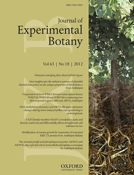
JOURNAL OF EXPERIMENTAL BOTANY
Exploring the intricate world of plant functions.JOURNAL OF EXPERIMENTAL BOTANY, published by Oxford University Press, stands as a premier journal for researchers and professionals in the fields of plant science and physiology. With an illustrious history dating back to 1950, this journal has established itself as a critical resource for advancing our understanding of plant biology and its applications. It is recognized in the top tier of academic publishing, reflected in its Q1 rankings in both Plant Science and Physiology for 2023, and boasts impressive Scopus rankings—placing it in the 96th and 91st percentiles of its respective categories. Though not an open-access journal, it ensures widespread access to groundbreaking research aimed at unraveling the complexities of plant functions and adaptations. As we look toward 2024, the JOURNAL OF EXPERIMENTAL BOTANY continues to play an essential role in fostering innovation, collaboration, and education within this vital area of science.
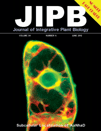
Journal of Integrative Plant Biology
Fostering Interdisciplinary Growth in Plant ResearchThe Journal of Integrative Plant Biology, published by WILEY, is a premier academic journal that has been at the forefront of advancing research in plant biology since its inception in 2005. With a notable impact factor and a robust Scopus ranking—positioned at #7 out of 516 in Plant Science and #18 out of 438 in Biochemistry—this journal is recognized as a Q1 journal in multiple categories, including Biochemistry and Plant Science. The journal aims to bridge the gaps between various disciplines in plant research, emphasizing integrative and interdisciplinary approaches to understanding plant biology. With options for open access, the Journal of Integrative Plant Biology ensures broad visibility and impact of research findings, making it an invaluable resource for researchers, professionals, and students looking to stay informed on innovative advancements in the field. Its headquarters are located in the United Kingdom, further amplifying its reach within the global academic community.
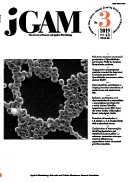
JOURNAL OF GENERAL AND APPLIED MICROBIOLOGY
Advancing microbial insights for a healthier tomorrow.JOURNAL OF GENERAL AND APPLIED MICROBIOLOGY, published by the MICROBIOL RES FOUNDATION, is a vital resource in the fields of applied microbiology and biotechnology, as well as in diverse medical applications, serving an academic community dedicated to advancing microbial science. Established in 1955, this journal has a rich history of disseminating innovative research and insights into the intricate world of microorganisms. With an ISSN of 0022-1260 and an E-ISSN of 1349-8037, the journal maintains high scholarly standards and robustness, reflected in its 2023 Scopus rankings placing it in the Q3 and Q4 quartiles within its categories. While primarily based in Japan, the journal engages a global audience, offering valuable contributions that inform both theoretical perspectives and practical applications in microbiology. Despite being a non-open-access publication, it provides pivotal research findings essential for academics, professionals, and students alike, fostering a deeper understanding of microbial impact on health and the environment.
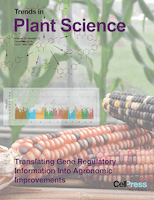
TRENDS IN PLANT SCIENCE
Leading the Way in Plant Science InnovationTRENDS IN PLANT SCIENCE is a premier academic journal published by CELL PRESS, dedicated to advancing the field of plant sciences. With an ISSN of 1360-1385 and E-ISSN 1878-4372, this journal has established itself as a critical resource for researchers and practitioners alike, boasting a remarkable impact factor that places it in the Q1 quartile for plant science in the 2023 rankings. Featuring a comprehensive scope that encompasses emerging trends, innovative research, and pivotal reviews in the plant sciences, it aims to promote interdisciplinary dialogue and encourage progressive research methodologies. Hailing from the United Kingdom, TRENDS IN PLANT SCIENCE serves a global community of over 516 journals, achieving a top-tier ranking of 3rd in the Scopus ranking for Agricultural and Biological Sciences. This makes the journal an indispensable asset for anyone aiming to keep abreast of the latest developments in plant biology and its applications. As we look towards its future converging years from 1996 to 2024, the journal continues to foster scholarly excellence and innovation in the field.

Cell Stress
Fostering Global Collaboration in Biochemical DiscoveriesCell Stress is a prestigious, peer-reviewed open access journal dedicated to advancing research in the fields of biochemistry, genetics, molecular biology, cancer research, and physiology. Published by SHARED SCIENCE PUBLISHERS OG in Austria, this journal has rapidly established itself since its inception in 2017, achieving Q1 status in multiple categories, indicative of its high impact and quality. With an impressive Scopus ranking—holding a top percentile position in its respective fields—Cell Stress aims to foster interdisciplinary collaboration and disseminate cutting-edge findings that enhance our understanding of cellular stress mechanisms and their implications in health and disease. The journal's commitment to open access since its launch ensures that critical research is accessible to a global audience, thereby facilitating the exchange of knowledge among researchers, professionals, and students alike. Address your submissions or inquiries to AM BLUMENHAG 25-4, Graz 8010, Austria, and contribute to this dynamic platform that is shaping the future of molecular medicine.
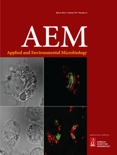
APPLIED AND ENVIRONMENTAL MICROBIOLOGY
Driving Impactful Discoveries in Applied MicrobiologyApplied and Environmental Microbiology, published by the American Society for Microbiology, stands as a leading journal in the fields of applied microbiology and environmental science since its inception in 1976. With a prestigious Q1 quartile ranking across multiple categories including Applied Microbiology and Biotechnology, Ecology, and Food Science, this journal consistently disseminates high-impact research that drives innovation and advances our understanding of microbial interactions within our ecosystems and industries. As ranked by Scopus, it exhibits prominent rankings in various related fields, underscoring its critical role in shaping contemporary microbiological research. Researchers, professionals, and students alike can stay abreast of groundbreaking studies while contributing to a vast body of knowledge that spans diverse aspects of microbiology, biotechnology, and ecology, ultimately contributing to sustainable practices. Join the community of dedicated scholars and explore vital research findings that impact both environmental health and technological advancement.

JOURNAL OF MICROBIOLOGY
Connecting global minds in the realm of microbiology.JOURNAL OF MICROBIOLOGY, published by the Microbiological Society Korea, is a prestigious peer-reviewed journal dedicated to the advancement of knowledge in the fields of microbiology, applied microbiology, and biotechnology. Established in 1996, this journal serves as a vital platform for researchers and professionals from around the globe to disseminate their findings and engage in multidisciplinary discussions pertaining to microbial sciences. With an H-index that reflects its impact, the journal holds a commendable Q2 ranking in key categories including Applied Microbiology and Biotechnology, as well as Medicine (Miscellaneous), which underscores its significance in the academic community. Despite being a subscription-based journal, the JOURNAL OF MICROBIOLOGY aims to contribute to the understanding of microbial processes and their applications, facilitating advancements that are essential in health, industry, and environmental sciences. Researchers, students, and practitioners are encouraged to explore this rich resource for the latest research and trends in microbiology.

OENO One
Elevating Standards in Food Science and Horticulture.OENO One, published by the International Viticulture and Enology Society (IVES), stands as a leading open-access journal dedicated to advancing the science of viticulture and enology since its inception in 2015. Operating out of France, this innovative journal is pivotal in disseminating high-quality research that impacts the fields of Food Science and Horticulture, evidenced by its notable category quartiles—Q2 in Food Science and Q1 in Horticulture as of 2023. With Scopus rankings placing it in the 82nd percentile in Horticulture and the 62nd percentile in Food Science, OENO One delivers timely insights and robust findings to its readers, fostering collaboration and knowledge exchange among researchers, professionals, and students alike. The journal embraces a forward-thinking approach, featuring research from various aspects of wine production, quality assessment, and viticultural practices, making it an essential resource for anyone involved in these disciplines.

JOURNAL OF PLANT BIOLOGY
Connecting Research and Ecology in Plant ScienceJOURNAL OF PLANT BIOLOGY, published by SPRINGER HEIDELBERG, is a leading academic journal dedicated to advancing the field of plant science. With an impressive impact factor signifying its high citation rate and rigorous peer-review process, this journal ranks in the Q1 category within Plant Science, placing it among the top-tier periodicals in the discipline. Established in 1999, it has become an essential resource for researchers, professionals, and students seeking the latest findings and developments in plant biology. The journal fosters a collaborative environment for sharing innovative research, exploring ecological interactions, and understanding plant physiology, thereby contributing significantly to advancements in sustainable agriculture and environmental conservation. Its high Scopus ranking of 102 out of 516 in the category of Agricultural and Biological Sciences further underscores its relevance and impact within the scientific community. For those interested in cutting-edge research, JOURNAL OF PLANT BIOLOGY is a vital source of knowledge, offering insights that are crucial for the future of plant science.